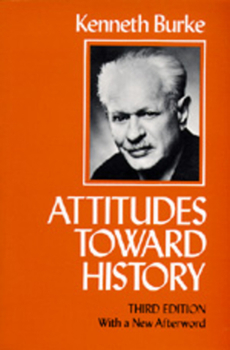Attitudes Toward History, Third Edition
Select Format
Select Condition 
Book Overview
This book marks Kenneth Burke's breakthrough in criticism from the literary and aesthetic into social theory and the philosophy of history. In this volume we find Burke's first entry into what he... This description may be from another edition of this product.
Format:Paperback
Language:English
ISBN:0520041488
ISBN13:9780520041486
Release Date:June 1984
Publisher:University of California Press
Length:434 Pages
Weight:1.10 lbs.
Dimensions:1.1" x 5.5" x 8.5"
Customer Reviews
2 ratings
America's best theorist
Published by Thriftbooks.com User , 21 years ago
Burke is America's answer to French postmodernism. In some ways, he is superior, but he is not as fun -- he's not just jibber-jabbering, though, and he isn't self-righteous. When he makes a point, too, it sticks. It's weird he's never been translated into French.
The concluding work in Burke's landmark pre-war trilogy
Published by Thriftbooks.com User , 23 years ago
In "Attitudes Towards History," Kenneth Burke moves from literary criticism to social theory and the philosophy of history. His subject is how communities are formed and reformed around attitudes of acceptance and rejection, attitudes that Burke sees as symbolized in the literary genres such as tragedy, comedy, satire and fantasy. Part I, "Acceptance and Rejection" develops acceptance, passivity and rejection in terms of the work of William James, Whitman and Emerson before developing the Poetic Categories he finds in literary genres and the Destiny of Acceptance Frames. Part II, "The Curve of History," breaks the past into periods of Christian Evangelism, Mediaveal Synthesis, Protestant Transition, Naive Capitalism, and Emergent Collectivisim, with a final chapter devoted to Comic Correctives. Part III, "Analysis of Symbolic Structure," looks at the General Nature of Ritual and them provides a Dictionary of Pivotal Terms such as Efficiency, Identification, Perspective by Incongruity, etc., which shows how language is saturated with evaluative ideas, images and biases. This volume also offers a substantial new afterword by Burke that looks back at his work in this volume and its companion, "Permanence and Change." It is the latter that stands out as the most important work in this first "trilogy" by Burke, which lays the foundation for our understanding of the relationship between rhetoric and social theory.





